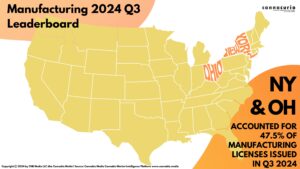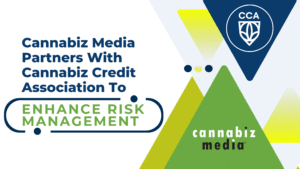Cannabis brand Ghost Drops says it has formally filed legal action against Health Canada for what it argues are unfair limitations on the company’s right to freedom of expression and the ability to engage in meaningful, competitive commerce due to Canada’s restrictions on the marketing of cannabis products.
The legal challenge, filed April 4, 2025, said Ghost Drops in a press release shared early Tuesday, April 29, is the result of a $500,000 fine imposed on the company by Health Canada for alleged breaches of the Cannabis Act’s restrictive marketing rules.
The company alleges that the half-million-dollar fine was the result of an investigation launched following public complaints about the company’s marketing efforts in 2023. Ghost Drops maintains that these accusations are exaggerated and highlight a “disproportionate” amount of enforcement.
The company’s president and founder, John Dean Durante, states that Ghost Drops is the first to receive such an “arbitrary” fine, arguing that the approach highlights inconsistency on the part of the federal regulator.
“We are the epitome of what the Cannabis Act was designed to achieve,” said Durante in a press release. “We were a legacy cannabis brand which transitioned to a legal cannabis business. We employed dozens of people, generated millions in tax revenue for our government while helping convert thousands of legacy consumers to legal tax paying consumers.”
“We didn’t do anything different from what our competitors do, did we do it better?,” he asks. “Maybe? but allegedly violating an unconstitutional marketing regulation is a far cry from endangering human health.”
Ghost Drops first launched as a legacy brand, pre-legalization, before officially entering the legal cannabis market in Canada in 2021. The company closed a retail location in 2023, after acquiring a production licence in 2022. The company has sold its branded products in the Canadian marketplace by entering into supply agreements with different Canadian growers.
Although the press release does not provide specifics about the marketing actions that led to the large fine, the company maintains that it was focusing on customer experience, data analysis, and optimization while leveraging digital marketing channels such as SEO, social media, and email marketing, including influencer marketing and affiliate programs. It also argues that other companies are running similar campaigns and not facing any such enforcement actions.
The brand argues that its fine is punitive in nature and that it was treated unfairly, which negatively impacted its ability to effectively compete in the marketplace.
“The cannabis industry lacks organized lobbying power that other regulated industries possess. This provides regulators broad discretion when interpreting and enforcing regulations,” said Ghost Drops CEO Gene Bernaudo in the same press release. “Without well-established advocacy groups to represent their interests, cannabis businesses often find themselves at the mercy of regulators who may apply rules based on their individual interpretations rather than consistent industry standards.
“This lack of coherent representation creates uncertainty and variability in enforcement, which can lead to inconsistent application of the law. As a result, businesses within the cannabis sector often navigate an unpredictable regulatory landscape, making compliance challenging and fostering an environment where some players may face stricter scrutiny than others based solely on regulatory whims.”
Ghost Drops has enlisted Kirk Tousaw, a lawyer well-known in the cannabis space, to advocate on their behalf. Tousaw works in the industry and, in the past, led a successful court challenge against what was an effective ban against cannabis edibles in 2015.
“I think it is clear that the marketing restrictions violate the commercial free speech rights protected by section 2 of the Charter,” said Tousaw. “The real issue for trial will be whether the government is entitled to override those rights and, if so, whether the rules as applied minimally impair those critical freedoms in a way that is rationally connected and proportionate to the government’s goals. We say that cannabis, a far safer product than alcohol, can’t be treated in such a heavy-handed way by the government.”
Ghost Drops argues that it should be allowed to engage in the same kinds of marketing practices used by alcohol and pharmaceutical drug manufacturers.
Health Canada was not immediately available for comment. This article will be updated if and when the agency provides comment.
Many in the cannabis industry have long protested what they say are double standards with Health Canada’s strict marketing regulations for cannabis. Unlike other products, including alcohol, cannabis companies are largely restricted from marketing and promoting products outside of age-gated settings
According to the most recently available information from Health Canada, as of October 2024, the health agency had issued just two Notice of Violations (NOV) associated with potential violations of promotion prohibitions since October 17, 2018.
Between October 17, 2018 and March 31, 2024, Health Canada assessed 1,541 cases of potential non-compliance related to promotions. This resulted in 648 actions taken, the vast majority of which were compliance emails, letters, or compliance promotion emails or calls.
Between April 1, 2023 and March 31, 2024, Health Canada assessed 243 cases of potential non-compliance related to promotions. This resulted in 134 actions with regulated parties, which may include one or more of the following: warning letters, compliance emails or letters.
Despite all of this activity, as of the end of March 2024, the federal agency has only issued two Notice of Violations (NOV) associated with potential violations of promotion prohibitions since October 17, 2018.
Health Canada also says that they conducted five inspections at promotional events from April 1, 2018, to March 31, 2019, two in Toronto, one in Oro-Medonte, Ontario, one in Victoria, BC and one in Regina.
The federal Cannabis Act includes several enforcement tools that can be considered when deciding on the appropriate enforcement actions to prevent or address non-compliance. While these tools do include options, from calls and/or letters to suspension or cancellation of a federal licence, the issuance of a ministerial order, or the issuance of administrative monetary penalties (AMP) of up to $1 million, the federal government tends to take a soft-touch approach, focusing more on first informing licence holders of their potential violations of federal rules before escalating to more significant penalties.
Health Canada uses information from both internal and external sources to help identify any possible risks to public health and public safety. However, a spokesperson for the agency in the past told StratCann that they do not collect data that shows how they became aware of any potential issues.











